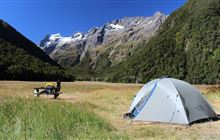Camping gear list
Introduction
What to take when camping at DOC-managed campsites.For backcountry camping as part of a tramping trip, use the overnight and multi-day tramp gear list.
Camping equipment
- Tent
- Sleeping mat
- Hammer/mallet for banging in tent pegs
Optional:
- Ground sheet
Personal equipment
- Sleeping bag – 3–4 season
- First aid kit
- Head torch/flashlight and spare batteries
- Rubbish bag – you need to take your rubbish away with you at most DOC campsites
- Towel
- Evidence of your booking when staying at a bookable campsite. Cash (with the correct change for the camp fees) or a campsite pass for non-bookable campsites.
Optional:
- Pillow, for example an inflatable camping pillow
- Hot water bottle
- Distress beacon (this allows you to summon help even if there is no cell phone reception – learn more and see where to hire/buy beacons)
- Camping chairs
- Camping table
- Solar charger/powerbank for electronic devices
- Umbrella
- Extra blanket
Toiletries
- Toiletries, including insect repellent, sunscreen, and personal medication, for example, antihistamine for allergy to wasp stings.
- Toilet paper – this is provided at some campgrounds, but we recommend bringing some anyway as a back-up.
- Hand sanitiser or soap.
Cooking equipment and food
- Drink bottle
- Matches or lighter in waterproof container
- Gas cooker and fuel, for example, gas canister – a handful of campsites may provide cooking facilities, but most do not. Check the campsite webpage to see what’s provided.
- Eating and cooking utensils – knife, fork, spoon, plate, cup, pot/pan/billy, cleaning kit, tea towel
- Large container of drinking water, equipment to boil water or water treatment tablets. A small number of DOC campsites provide treated drinking water, but at others water should be brought, boiled or treated. The water supply type is listed on each campsite page on our website.
- Container (e.g. chilli-bin) for storing food to keep pests away at night (or put your food in your car at night)
You cannot buy food at most DOC campsites.
Always make sure to take extra food in case of delays, as well as plenty of snacks. Pick food that is easy to prepare, keeps well at room temperature, and is fast cooking.
Some DOC campsites do not have water supplied. Check our website page for the campsite to see whether you need to bring your own. At most campsites where water is provided, you will need to treat/boil it before use.
Clothing
It can be hard to dry clothes while camping, so take spare clothes and choose quick drying fabrics (e.g. wool, polypropylene, activewear fabrics).
Rain and cold weather are common at any time of year in New Zealand. Packing plenty of warm and waterproof clothing will help you stay cosy while camping. This should include:
- warm underlayers, top and bottom
- warm mid-layers
- a waterproof, windproof raincoat with a hood
- hat, scarf and gloves
- warm nightclothes/clothing to sleep in.
Avoid sunburn by packing a sunhat and sunglasses.
Bring firm, comfortable footwear as campsites often have uneven ground and nearby walking tracks. Firm, comfortable footwear includes tramping boots or sneakers.

